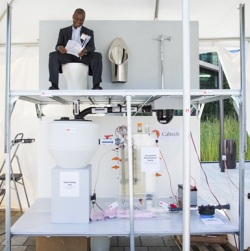
by Brianna Crandall — August 27, 2012—Bill Gates announced on August 14 the winners of the Reinvent the Toilet Challenge, an effort sponsored by the Bill and Melinda Gates Foundation to develop “next-generation” toilets that will deliver safe and sustainable sanitation to the 2.5 billion people worldwide who do not have it, and to help transform traditional water-guzzling, waste-producing flush toilets in wealthy nations as well. The awards recognize researchers from leading universities who are developing innovative ways to manage human waste, which will help improve the health and lives of people around the world.
California Institute of Technology in the United States received the $100,000 first prize for designing a solar-powered toilet that generates hydrogen and electricity. Loughborough University in the United Kingdom won the $60,000 second place prize for a toilet that produces biological charcoal, minerals, and clean water. University of Toronto in Canada won the third place prize of $40,000 for a toilet that sanitizes feces and urine and recovers resources and clean water. Special recognition and $40,000 went to Eawag (Swiss Federal Institute of Aquatic Science and Technology) and EOOS for their outstanding design of a toilet user interface.
The teams competed to meet the challenge that the Gates Foundation issued a year ago to design toilets that can capture and process human waste without piped water, sewer or electrical connections, and transform human waste into useful resources, such as energy and water, at an affordable price. Teams showcased their prototypes and projects at the foundation’s headquarters in Seattle on August 14 and 15. The Reinvent the Toilet Fair brought together participants from 29 countries, including researchers, designers, investors, advocates, and representatives of the communities who will ultimately adopt the new inventions.
Unsafe methods to capture and treat human waste result in serious health problems and death, reminds the Gates Foundation. Food and water tainted with fecal matter result in 1.5 million child deaths every year. Most of these deaths could reportedly be prevented with the introduction of proper sanitation, along with safe drinking water and improved hygiene. Improving access to sanitation can also bring substantial economic benefits, delivering up to $9 in social and economic benefits for every $1 invested because it increases productivity, reduces healthcare costs, and prevents illness, disability, and early death, says the World Health Organization.
Other projects featured at the fair include better ways to empty latrines, user-centered designs for public toilet facilities, and insect-based latrines that decompose feces faster.
The foundation also announced a second round of Reinvent the Toilet Challenge grants totaling nearly $3.4 million. The grants were awarded to: Cranfield University (United Kingdom); Eram Scientific Solutions Private Limited (India); RTI International (United States); and the University of Colorado Boulder (United States).




